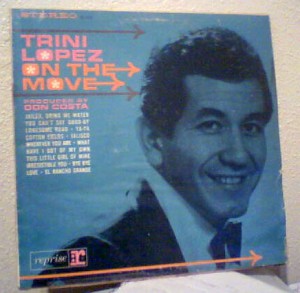
I’m no music aficionado. I like what I like. But I have to hear it first. Which means I’m not such a fan of music reviews.
Music reviews always seem so foreign to me… Using words to describe music? What’s next, writing a musical arrangement as a review of a book? Yeah, yeah, yeah, we use words to communicate; so even if music is communication in-and-of-itself, we use words to define it, explain it, sell it, share it. I myself trust what I hear.
So why, then, am I reading Simon Sweetman’s Blog On The Tracks — let alone adding “him” to the sidebar?
It’s not just our mutual love of Trini Lopez, or even vinyl. It’s because Sweetman makes me think thinky things.
In considering the value of music, records, and music collections — tangible objects which help keep music from being too temporal — there’s an elusive emotional component which is hard to put a price on… Yet it’s largely what makes music so important. It’s the power of the shared music experience.
The original joy of music was once a primarily shared experience. Folks gathered around fires, singing together — maybe a few slapping a thigh or smacking a rock or whatnot. But there was no level of “good enough to participate” in terms of pitch or talent or anything. And you can easily argue that even the lone hunter whistling or humming was recalling that tune from some earlier social feast when the group shared a melody. There was no professional musician then. Those guys and gals would come later.
And when they did, music was still about a shared experience. Not just in the Sing Along With Mitch way either. If you don’t believe me, get thee to a concert sometime. Or even your local watering hole — it needn’t have a live band, just a jukebox will do — and you’ll hear people singing (somewhat) along with the song, or slapping their thigh or whatnot. For that matter, how many times a week does your neighbor share their music selections with you via the unnecessarily loud volume? How about those cars which you hear approaching by the distorted vibrational boom of blasting base? In fact, folks today with their isolated musical experiences of earbuds will not be silent in their solos; they must share. Even if you cannot hear the song selection itself play, you are forced to hear your coworker scream-sing along. Or at least you think that’s what they are doing… You can’t actually identify the song, even if you can decipher the lyrics, but you’re pretty sure that’s “singing.”
The very fact that music with lyrics is the most popular type of music reinforces this notion of the power of shared musical experience; we want to participate by singing along.
The shared music experience is powerful. Congregations are built upon it. Relationships strengthened, and breakups survived, via those mixed tapes (which have not disappeared but merely moved to MP3 playlists). Even if the kids resist it at first, they come around to the power of shared musical experiences — even with their parents. That’s pretty compelling evidence.
2 Comments